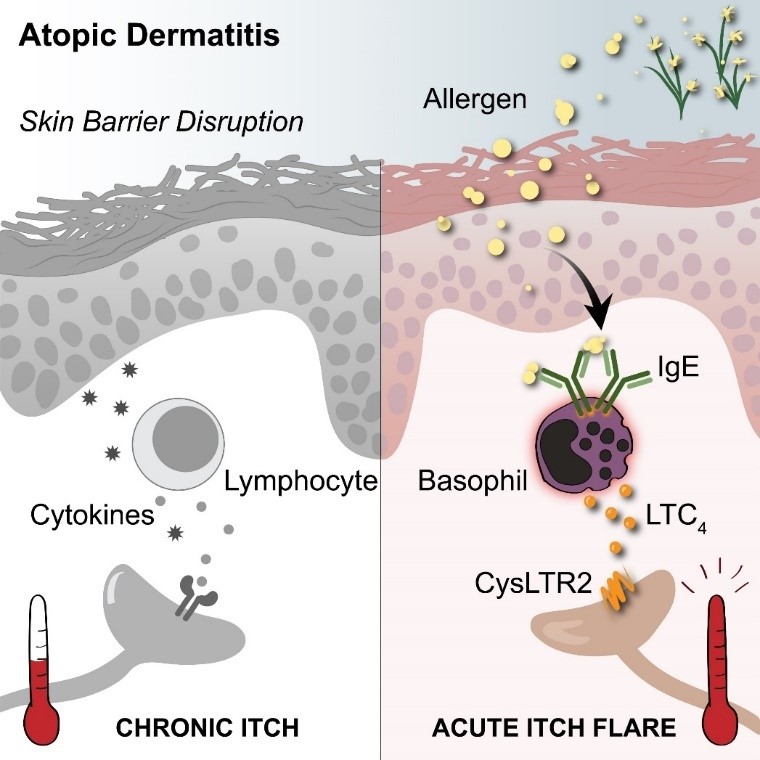Acute Itch Bursts Associated with Atopic Dermatitis Linked to Allergens -- A Novel Role for Basophils in Promoting Itch
The longstanding enigma of itch exacerbations in atopic dermatitis (AD) was recently unveiled to be linked with environmental allergens. The new findings, published on January 21 in the journal Cell, point to a possible new target and strategy to help patients with AD cope with those episodes of acute and severe itch.
Itch (i.e., pruritus) is defined as an uncomfortable sensation on the skin that causes a desire to scratch. Although acute itch is protective by inciting scratching behavior to rapidly expel pathogens and noxious stimuli, chronic itch (defined as itch lasting longer than 6 weeks in clinical practice) is usually pathologic in nature, underlying a variety of medical conditions that range from inflammatory skin disorders to chronic kidney disease and cancer. Notably, patients with chronic itch often experience acute itch flares (i.e. rapid and intense exacerbations of itch).
AD is a pruritic inflammatory skin disease with a chronic but relapsing course, which is characterized by scaly, leaky, and oozing skin. Patients with AD become epicutaneously sensitized to environmental allergens and thus harbor allergen-specific IgE. In addition to chronic itch, patients with AD patients often experience intense bursts of acute exacerbations. However, the mechanisms underlying this remain unclear.
The work published by Dr. WANG Fang et al. identified that patients with AD who harbor allergen-specific IgE exhibit a propensity for acute itch flares from analyses of high resolution clinical trial data. Using animal models, Dr. Wang further demonstrated that acute itch exacerbations induced by allergens were mediated by an innate immune cell population that is called basophils and their related leukotriene C4, a typical inflammatory factor. Although rare in circulation, basophils exhibited direct interactions with sensory neurons in the skin and the specific activation of basophils is sufficient to provoke scratching behaviors in research animals. These findings reveal a previously unrecognized role of basophils in promoting itch and clearly outline new therapeutic targets to advance novel treatments for itch in patients.
Dr. WANG Fang is an Associate Professor in Department of Dermatology at The First Affiliated Hospital, Sun Yat-sen University. In 2017, she joined the laboratory of Dr. Brian Kim in the Center for the Study of Itch and Sensory Disorders of Washington University School of Medicine and started investigating itch mechanisms underlying skin disorders. As a physician scientist, she is committed to performing clinically relevant, fundamental biomedical research with the aim of improving patient care and advancing scientific knowledge. Her achievements not only build a consolidated foundation for translational research on disease prevention and treatment, but also open new avenues for the hospital’s further collaboration with foreign research institutions.

Graphical abstract


